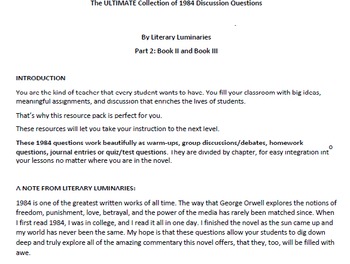The ULTIMATE Collection of 1984 Discussion Questions, Parts II and III
- PDF
Description
These 1984 questions work beautifully as warm-ups, group discussions/debates, homework questions, journal entries or quiz/test questions. They are divided by chapter, for easy integration into your lessons no matter where you are in the novel.
A NOTE FROM LITERARY LUMINARIES:
1984 is one of the greatest written works of all time. The way that George Orwell explores the notions of freedom, punishment, love, betrayal, and the power of the media has rarely been matched since. When I first read 1984, I was in college, and I read it all in one day. I finished the novel as the sun came up and my world has never been the same. My hope is that these questions allow your students to dig down deep and truly explore all of the amazing commentary this novel offers, that they, too, will be filled with awe.



